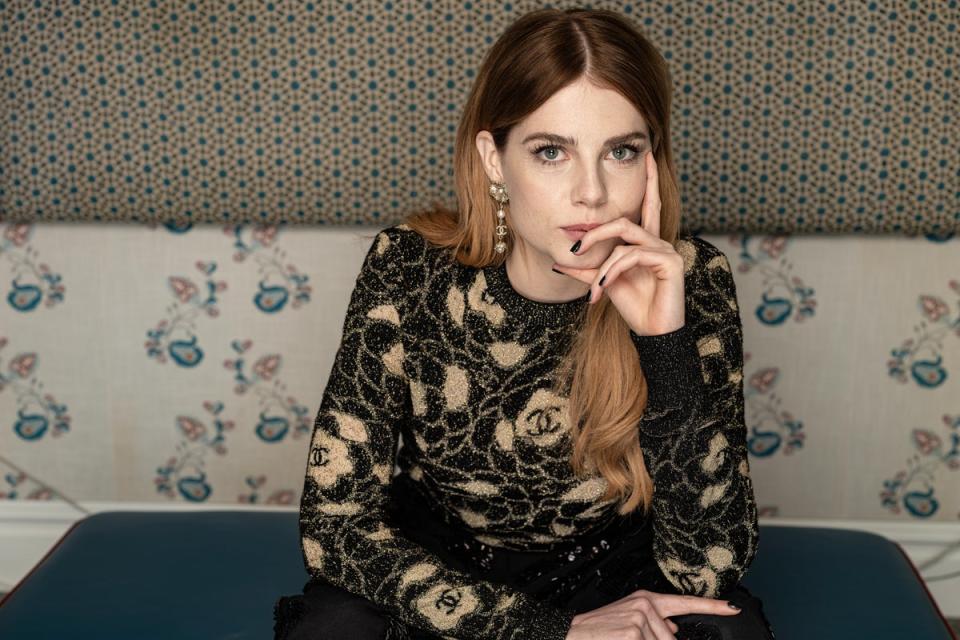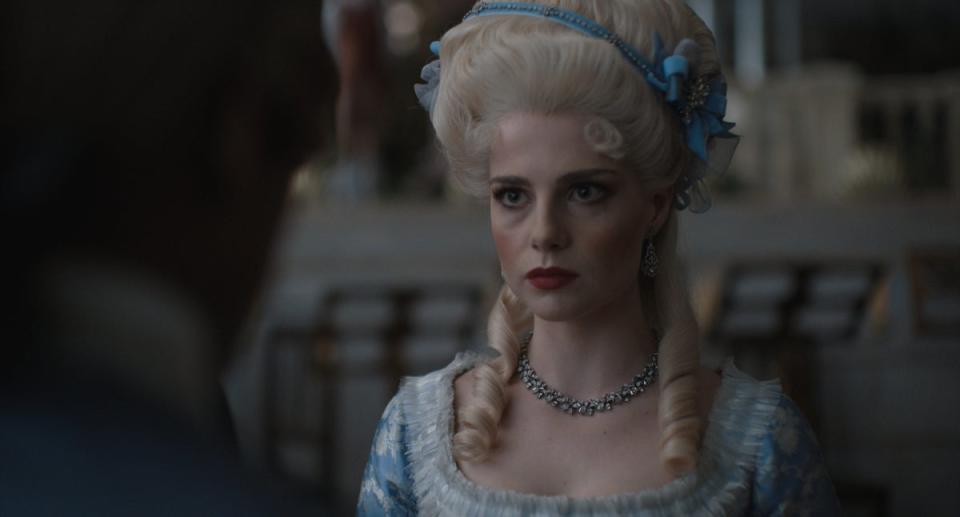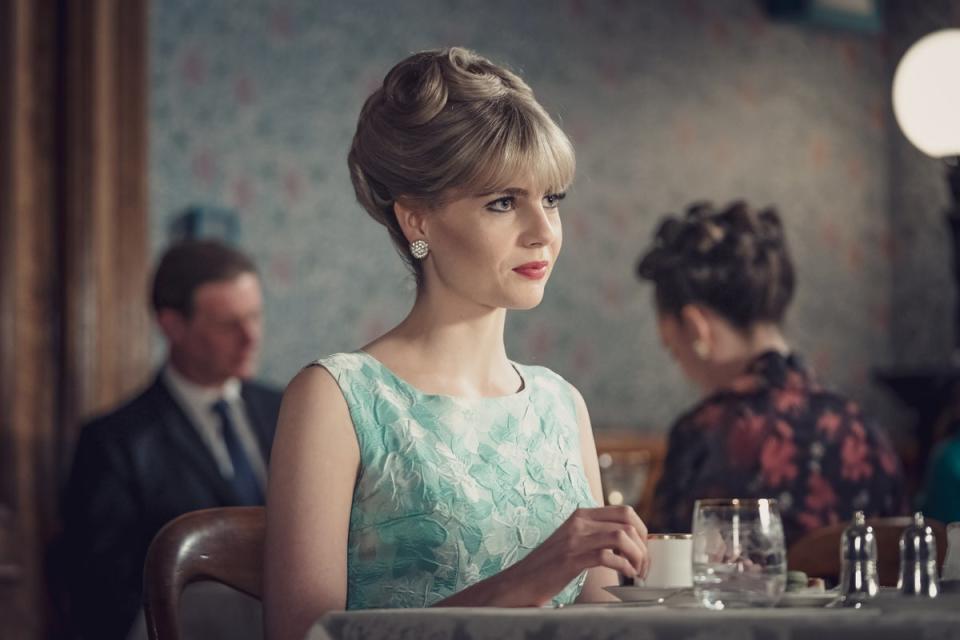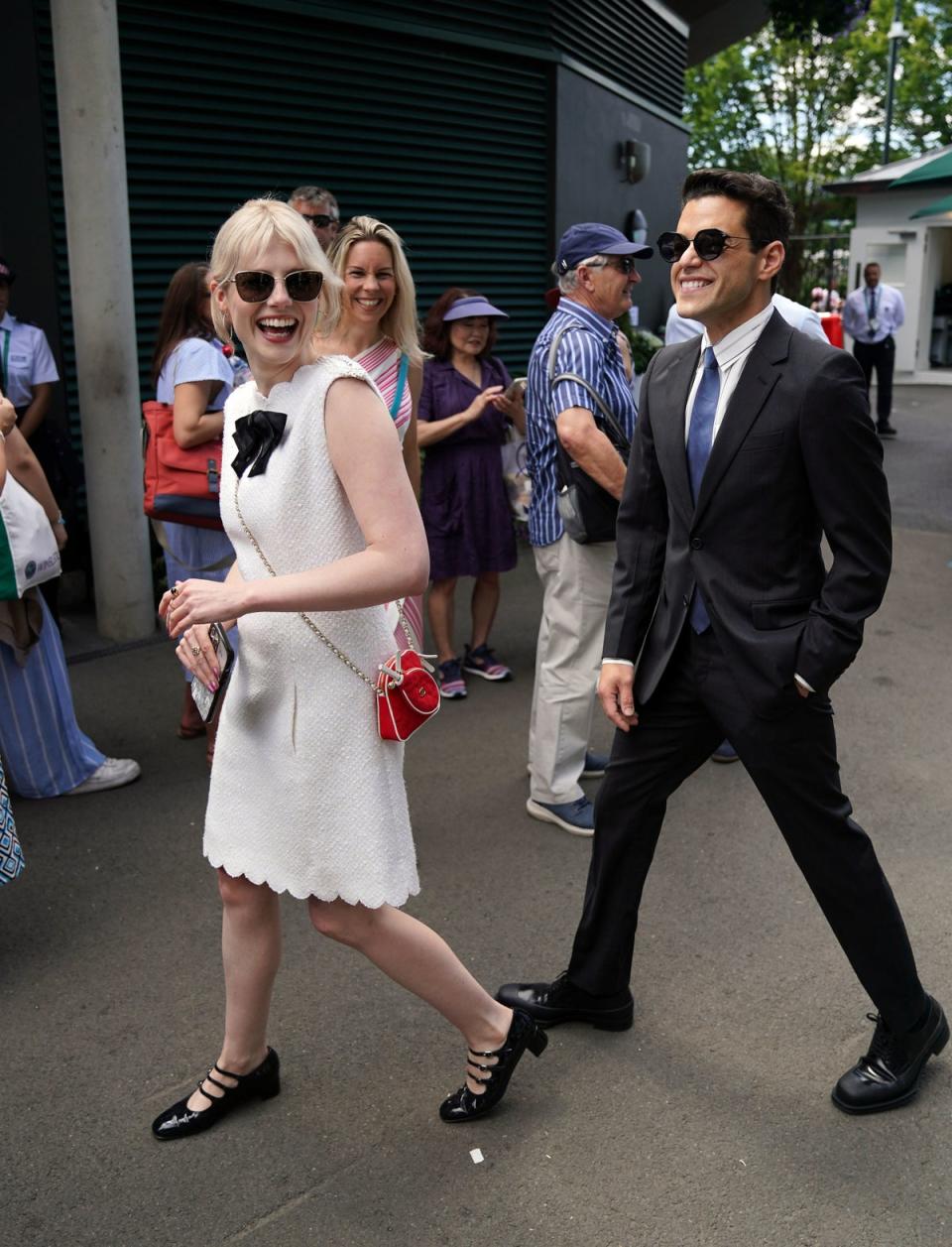Chevalier’s Lucy Boynton: ‘women’s stories do not only fuel male narratives’

Is it possible to get more period-drama-iconic than Marie Antoinette? The ludicrous wigs, the massive frocks, the juicy (if incorrectly attributed) quips (she never said “Let them eat cake”). The latest woman to play the ill-fated queen, British actor Lucy Boynton who depicts her in the film Chevalier, is no stranger to time travel having hopped back to the 19th century for her screen debut aged 12 playing a young Beatrix Potter in Miss Potter, the early 20th in Hugh Laurie’s riotous Agatha Christie adaptation Why Didn’t They Ask Evans?, the swinging sixties in ITV’s remake of The Ipcress File and the 70s in Oscar winning film Bohemian Rhapsody (where she met her now-partner, Rami Malek).
It seems appropriate for someone whose personal style seems to hail from a glamorous bygone era (she’s wearing a grandiose floor-length black and gold vintage dress when I meet her in a plush Soho hotel) but the last queen of France is a particularly fascinating challenge for Boynton, partly because she’s been played so many times before.
“I put aside all of the preconceived notions I had about her and started from scratch,” she says. She “watched everything, read everything” about Antoinette in preparation for the part, though of course, most of that had been written by men.
“History has such a specific author,” she says, “and I had totally been sucked into that narrative of having a really specific idea of her.” Marie Antoinette was just 14 years-old when she entered the French court, a sheltered child, but, Boyton points out, “very rarely do we see criticism for [her husband] King Louis, who was the reigning monarch… the man in power. Marie Antoinette as a woman in that era didn’t have any legitimate power so it’s interesting that so much blame is assigned to her.”

In Chevalier, we see an older Antoinette, nearing the latter days of her reign. The story centres around the acclaimed composer Joseph Bologne (Kelvin Harrison Jr.), the illegitimate son of an enslaved Senegalese woman and a French plantation owner. Bologne was a prodigious talent (we see him besting a petulant Mozart in a sort of violin play-off) and wowed audiences across France.
Antoinette made him a member of her court – it was she who gave him the title Chevalier de Saint-Georges – but the pair eventually fell out after she refused to support him when he was faced with bigotry from the Paris Opéra. Bologne would later go on to fight in the revolution in the service of the Republic.
Boynton says while Antoinette has been “villainised throughout history,” generally it’s not for what she did to Bologne, of whom most people haven’t even heard. “Had she been villainised for what she does in this film, it would’ve been completely understandable and earned,” she says.
“[In the film] you see her trying to take more ownership of her path… we see her reach the fork in the road and we see this opportunity for her to go the right way or the wrong way. Unfortunately as we all know, she [went] on the wrong side of history, fuelled by fear and a kind of remorseless sense of self-preservation.”
Boynton says despite Bologne’s incredible musical talents – as well as his ability as a competitive fencer and soldier – his legacy was to become a mere footnote in history books for years. The composer was often referred to as ‘the Black Mozart’ and not even by his own name.
“I think this film is a great reminder to challenge history as we’ve been presented with it, because we’ve been presented with a really doctored version of it, a really specifically and strategically angled version of history that is inaccurate,” Boynton says.
“The fact that we’ve erased him is such a sign of what we are missing in terms of our accurate societal history. Hopefully this film can be a catalyst to keep finding those people in our society, in our history, whose stories we’ve ignored and neglected.”

Boynton, who posted on social media about ongoing societal racism in the wake of George Floyd’s murder in 2020, says there are many disappointing comparisons with the treatment of Bologne then and what we’re still seeing today. She found a depressing number of “contemporary references” to draw on, she says, for some of the things Marie Antoinette says to Bologne.
“It’s just really devastating to have such clear parallels with such dark and negative elements of human behaviour,” she sighs. “You walk away [from the film] I think deeply impacted... you really feel for these characters and suddenly it hits you, all the parallels that can be drawn between the 1700s and 2023.”
A few years before Boynton got her break with Miss Potter, the parallels between the treatment of women centuries ago and now weren’t that dissimilar either, as stories of #MeToo and discrimination flooded Hollywood. By the time Boynton started, she says a shift in the industry had begun.
“I am very aware that I joined the industry at a time where already it was already in the process of changing,” she says. “Already I was a beneficiary of these incredibly bold and brave women who spoke up at a time when it was immediately detrimental to them.
”I think what is happening more and more is that the industry is realising that you have to reflect an accurate version of the world back at itself,” she says. “It’s not enough to just continue on this road of portraying a really myopic view of the world, and it became clear that wouldn’t stand any more. I think that’s what we’re seeing really… [we’re] getting closer to an accurate representation of society [but] I still think that process is really slow.”
On the set of Chevalier, Boynton says she was surrounded by powerful women – not least Minnie Driver, who plays opera singer Marie-Madeleine Guimard in the film. “Just speaking to [someone] like Minnie, who has such extensive experience of the industry, having started so young [was incredible],” she says, “it was fascinating talking to her.”

Boynton says actors like Driver and others paved the way for her and others to break through; likewise, having more women in the writer’s room has resulted in more realistic female characters emerging (Chevalier was written by Atlanta’s Stefani Robinson).
“It comes from all of the women in the industry before who finally put their foot down and said ‘this isn’t what women are like. This is not an accurate landscape or an accurate portrayal of our societal landscape,” Boynton says. “‘This is not the extent of women’s stories, that they are only fuelling a male narrative’. I’m so grateful to them because they are the reason that I am now reading scripts for really complex women and why throughout my career I’ve not had to just play the girlfriend role or something [that] women were relegated to previously.”
She says the gothic genre in particular, something she gravitates towards – “I really love dark pieces”– has got far better at writing women in recent years. “When you’re brought up as a girl, you’re given this narrative that you’re a victim, and so there is something empowering to be a part of a story [in this genre] that you’re the source of fear instead of just a victim of it.”
Boynton says she wants to make more films like Chevalier that “start conversations” on challenging topics. “I think the entertainment industry offers an opportunity – in a really accessible, empathetic way – to hold a mirror up at ourselves, past and present,” she says.
Chevalier “is an example of doing that in a way that it doesn’t feel like you’re sitting through a history lesson,” she continues. “You can really understand how it pertains to our society right now and I think it is vital to do that, to keep self-reflecting and to keep questioning. Even when this industry is just escapism, just entertainment, that is such important respite and can still be effective in kind of Trojan horse-ing a really important message or inviting you to experience someone’s life in a way that you otherwise don’t have such access to.”
Similarly, she says, Bohemian Rhapsody triggered conversations by showing how Freddie Mercury (played by Malek), succeeded despite, “society [telling] you, you can’t” or trying to “fit [someone] in a box” they don’t want to be in because of their sexuality or appearance. “Both Freddie and Joseph [Bologne] were great pinnacles of not doing that,” Boynton says.

Her experience on both films has made her re-think the type of projects she does in the future, making her “want to gravitate towards putting out really positive projects into the world.” Audience reactions to both were thrilling, including those “leaving Chevalier and saying [they’re] going to pick up a classical instrument”.
So what’s next for Boynton? “I just did this film The Greatest Hits and it’s the first contemporary piece that I’ve done in so long and it’s so surreal watching it,” she smiles. “I recognise myself less in that film than I do when I see myself in like the 30s or 40s. I really love doing period pieces because I love any kind of…writing that is a real extraction from my day-to-day experience.”. So a return to period dramas again soon then? “Hell, yeah!” she laughs.
Chevalier is in cinemas


